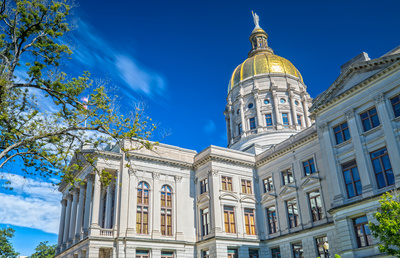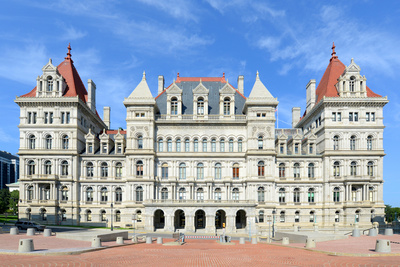
Data Centers, Tax & Budgets
States Rethink Data Center Tax Incentives as Costs Soar
February 4, 2026 | Morgan Scarboro
March 10, 2021 | Ryan Maness
-8ba475-1200px.jpeg)
Key Takeaways:
April 20, 2021 update: In the final hours of West Virginia's legislative session, the House unanimously rejected the tax reform package passed by the Senate and pushed by Governor Jim Justice. Speaker Hanshaw said that he agreed with his colleagues that personal income tax relief was important for West Virginia moving forward, but that the revenue swap offered in HB 3300 was not the way to do it. We expect lawmakers to return to this issue during a special session at some point, but given the policy gulf within the legislature, it's unclear when exactly that will be.
April 8, 2021 update: In a 18-16 vote yesterday evening, the West Virginia Senate narrowly passed a newly amended version of House Bill 3300. The bill now applies a 3 percent excise tax to the sale of professional services, with legal and accounting services explicitly singled out for taxation. The bill also increases the sales tax rate to 8 percent, eliminates tax exemptions for digital products and data processing, and levies additional severance taxes The new language emerged after Governor Justice held a legislative summit on Monday, urging the legislature to place less of the onus for cutting the personal income tax on lower-income households.
Whenever West Virginia Governor Jim Justice (R) discusses his plan to eliminate his state’s personal income tax, he reiterates two key points: (1) the tax will be a net positive for West Virginia taxpayers and (2) it will lead to significant population growth for the state. To back up his claim, the governor’s administration released an abstract of his bill that includes a revenue breakdown of its policies. Looking at the numbers the average individual taxpayer would see a net tax reduction, but here’s the kicker: Governor Justice’s proposal is a $230+ million business tax increase.
Before looking at the new taxes businesses will pay, we’ll first consider what they stand to gain from the governor’s proposal. According to a West Virginia Center on Budget and Policy study, the personal income tax brought in $2.096 billion in revenue in FY19. Of this, about $200 million was contributed by the business community, per a FY19 Council On State Taxation (COST) study. This means that approximately 9.5 percent of the state’s personal income tax revenue is derived from pass-through business income. Applying this percentage to the $1,035,650,000 that Governor Justice’s abstract estimates his personal income tax cuts will save state taxpayers, we find that business owners, under the most generous interpretation, would benefit from about $100 million tax cut.
Depending how the law is interpreted, however, even this benefit could evaporate. The bill creates a new distinction between business and nonbusiness personal income taxes. All of the reductions would redound to the latter, while the former would remain at current levels. Assuming that this definition of “business personal income” encompasses the entirety of state business’ liability under this tax, West Virginia employers would receive no tax benefit at all from this proposal. In other words, it is likely that the $100 million personal income tax cut identified above is a phantom cut that will not be effectuated.
The other side of the ledger is far worse for businesses. COST performed a separate study in 2019 on the impact of taxing business inputs that estimated that 44 percent of West Virginia’s state and local sales tax falls on business purchases, which means businesses would pay $209 million in new taxes as a result of the governor’s proposed sales tax rate hike.
The math already shows the governor’s reform is a business tax hike. But there’s more. When considering the business impact of the sales tax base expansion, we have to make some assumptions because of uncertainties regarding exactly what will become taxable. The current bill language (HB 2027 / SB 600) states that the sales tax will be expanded to include “professional services.” The allocation of sales taxes between individual and business taxpayers varies depending upon the service being taxed. Fortunately, the COST sales tax study provides such a differential breakdown for thirteen different industries. Cross-referencing these sectors with those specifically called out in the bill abstract, we can see this general range of new business tax burdens arising from sales tax base expansion.
Service Type | Business Share | Individual Share |
Accountancy services* | 81% | 19% |
Computer systems design and related services | 100% | 0% |
Data processing | 77% | 23% |
Legal services | 68% | 32% |
*This figure is based off an internal analysis that MultiState performed in 2019.
This would mean that the sales tax base expansion’s $180 million price tag would cost businesses at least $122.4 million.
Combined with the cost of the tax rate increase, businesses would be on the hook for at least $330 million in new taxes from the sales tax provisions alone. This would be mitigated somewhat if businesses are able to subtract out the income tax cut—leaving a new additional liability of $230 million—but the plain language of the legislation suggests that the true tax increase which would fall on state employers is $330 million.
When West Virginia lawmakers assess whether this bill is the right course for their state, they should have a clear view of all of its costs and benefits. While individual taxpayers will see a net tax cut, tax hikes on job creators could result in more harm to people than the benefit of a modest individual income tax cut.

February 4, 2026 | Morgan Scarboro

January 21, 2026 | Morgan Scarboro

January 6, 2026 | Morgan Scarboro